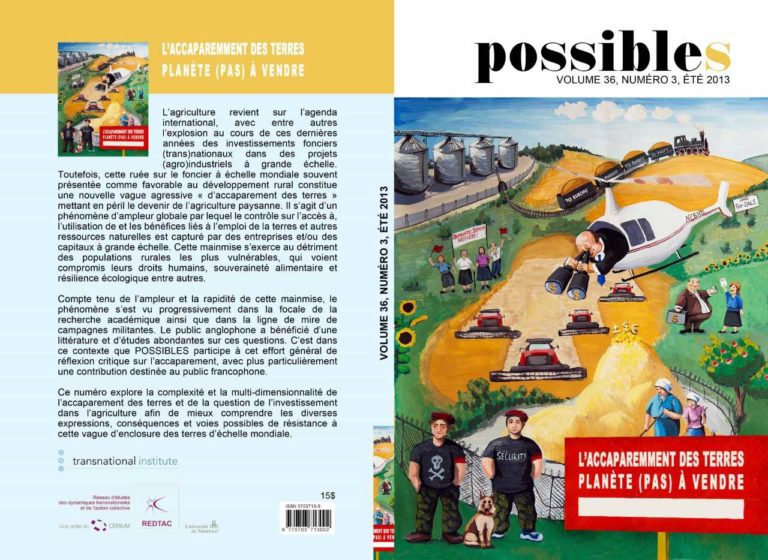Résumé
Les réformes agraires sont souvent perçues comme un outil essentiel à la lutte à l’accaparement des terres. L’analyse de la mobilisation paysanne aux Philippines pour le renouvèlement du programme de réforme agraire est une illustration de la capacité d’influence et du pouvoir du mouvement paysan. Lors de cette mobilisation, un nouvel acteur est apparu : les organisations internationales. Cependant, il reste à voir si la capacité de mobilisation du mouvement paysan persistera une fois la réforme adoptée et si cette dernière sera un outil efficace pour contrer l’accaparement des terres.Références
Abinales P.N.et Amoroso D.J. 2005. State and society in the Philippines, Lanham : Rowman and Littlefield.
Bates, Robert H. 1988. « Governments and Agricultural Markets in Africa », dans Toward a Political Economy of Development : A Rational Choice Perspective. Berkeley : University of California Press, : 331-358.
Bello W. 2009. “Afterthoughts CARPER: Latest Chapter in Agri Reform Battle. » Article publié dans le journal Inquirer le 22 juin 2009 et disponible en ligne http://opinion.inquirer.net/viewpoints/columns/view/20090622-211874/CARPER-Latest-Chapter-in-Agri-Reform-Battle
Borras S. et Franco J. 2005. “Struggle for Land and Livelihood: Redistributive Reform in Agribusiness Plantation in the Philippines.” Critical Asian Studies 37:3 331-361
Borras S. et Franco J. 2010. “Paradigme Shift: The ‘September Thesis’ and rebirth of the ‘Open’ peasant mass movement in the era of neoliberal globalization in the Philippines” dans Agrarian Angst and Rural Resistance in Contemporary Southeast Asia, Routledge p. 206-226
Caouette D. 2010. “Oligarchie, électoralisme et contestation politique: les dérives du néopatriminialisme et l’État philippin contemporrain.” Revue canadienne d’études du développement. 30:3-4, 365-379
Caouette D. et Turner S. 2009. Agrarian Angst and Rural Resistance in Contemporary Southeast Asia. Routledge
Diani, Mario. 1992. « The concept of Social Movement », The Sociological Review, 40, 1 :1-25
Evans, Peter B. 1995. « States and Industrial Transformation », dans Embedded Autonomy : States and Industrial Transformation. Princeton University Press, p. 3-20 et 227-250.
Fillieule, O. 2009. De l’objet de la définition à la définition de l’objet. De quoi traite finalement la sociologie des mouvements sociaux ? » Politique et sociétés, 28, 1 : 15-36.
Franco, J. 2008. “Making Land Rights Accessible: Social Movements and Political-Legal Innovation in the Rural Philippines”, Journal of Development Studie,s 44:07, 991-1002
Hawes, G. 1987. The Philippines State and the Marcos Regime : the politics of export, Ithaca : Cornell University Press
Houtzager, P. et Franco, J. 2003. When the poor make law: comparison across Brazil and the Philippines. Research note, Law, Democracy and Development Programme, Institute of Development Studies, Brighton.
Kaisahan. 2012. “CARPER Campaign: Milestones and Key Dates” Disponible en ligne: http://www.kaisahan.net/carper-the-triumph-of-the-filipino-peasantry-2/
Manahan, A. 2012. “Voices from the Countryside: Farmers speak of agrarian reform struggles” Publié dans Focus Policy Review: Whose Growth? Whose Democracy? 1:5 3-6. Disponible en ligne: http://focusweb.org/content/focus-policy-review-whose-growth-whose-democracy
Skocpol, Theda. 1985. « Bringing the State Back In : Strategies of Analysis in Current Research », dans Bringing the State Back In, dirigé par Peter B. Evans, Dietrich Rueschemeyer et Theda Skocpol : 3-37.
Tarrow, S. 1994. Power in Movement: Social Movements and Contentious Politics. Cambridge, Cambridge University Press.

